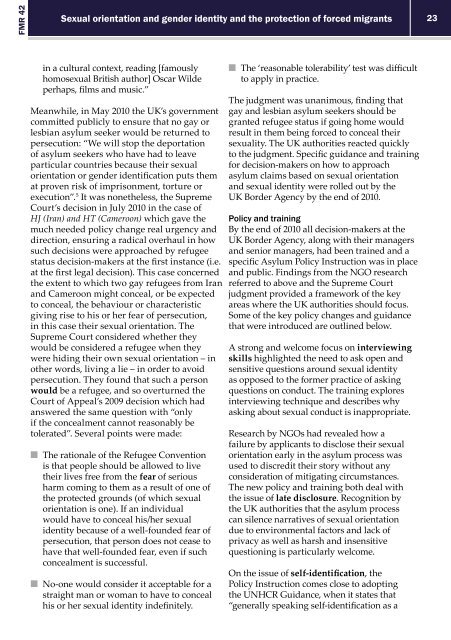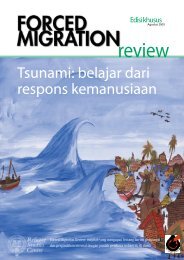FMR 42 full issue pdf - Forced Migration Review
FMR 42 full issue pdf - Forced Migration Review
FMR 42 full issue pdf - Forced Migration Review
You also want an ePaper? Increase the reach of your titles
YUMPU automatically turns print PDFs into web optimized ePapers that Google loves.
<strong>FMR</strong> <strong>42</strong><br />
Sexual orientation and gender identity and the protection of forced migrants 23<br />
in a cultural context, reading [famously<br />
homosexual British author] Oscar Wilde<br />
perhaps, films and music.”<br />
Meanwhile, in May 2010 the UK’s government<br />
committed publicly to ensure that no gay or<br />
lesbian asylum seeker would be returned to<br />
persecution: “We will stop the deportation<br />
of asylum seekers who have had to leave<br />
particular countries because their sexual<br />
orientation or gender identification puts them<br />
at proven risk of imprisonment, torture or<br />
execution”. 5 It was nonetheless, the Supreme<br />
Court’s decision in July 2010 in the case of<br />
HJ (Iran) and HT (Cameroon) which gave the<br />
much needed policy change real urgency and<br />
direction, ensuring a radical overhaul in how<br />
such decisions were approached by refugee<br />
status decision-makers at the first instance (i.e.<br />
at the first legal decision). This case concerned<br />
the extent to which two gay refugees from Iran<br />
and Cameroon might conceal, or be expected<br />
to conceal, the behaviour or characteristic<br />
giving rise to his or her fear of persecution,<br />
in this case their sexual orientation. The<br />
Supreme Court considered whether they<br />
would be considered a refugee when they<br />
were hiding their own sexual orientation – in<br />
other words, living a lie – in order to avoid<br />
persecution. They found that such a person<br />
would be a refugee, and so overturned the<br />
Court of Appeal’s 2009 decision which had<br />
answered the same question with “only<br />
if the concealment cannot reasonably be<br />
tolerated”. Several points were made:<br />
■■The rationale of the Refugee Convention<br />
is that people should be allowed to live<br />
their lives free from the fear of serious<br />
harm coming to them as a result of one of<br />
the protected grounds (of which sexual<br />
orientation is one). If an individual<br />
would have to conceal his/her sexual<br />
identity because of a well-founded fear of<br />
persecution, that person does not cease to<br />
have that well-founded fear, even if such<br />
concealment is successful.<br />
■■No-one would consider it acceptable for a<br />
straight man or woman to have to conceal<br />
his or her sexual identity indefinitely.<br />
■■The ‘reasonable tolerability’ test was difficult<br />
to apply in practice.<br />
The judgment was unanimous, finding that<br />
gay and lesbian asylum seekers should be<br />
granted refugee status if going home would<br />
result in them being forced to conceal their<br />
sexuality. The UK authorities reacted quickly<br />
to the judgment. Specific guidance and training<br />
for decision-makers on how to approach<br />
asylum claims based on sexual orientation<br />
and sexual identity were rolled out by the<br />
UK Border Agency by the end of 2010.<br />
Policy and training<br />
By the end of 2010 all decision-makers at the<br />
UK Border Agency, along with their managers<br />
and senior managers, had been trained and a<br />
specific Asylum Policy Instruction was in place<br />
and public. Findings from the NGO research<br />
referred to above and the Supreme Court<br />
judgment provided a framework of the key<br />
areas where the UK authorities should focus.<br />
Some of the key policy changes and guidance<br />
that were introduced are outlined below.<br />
A strong and welcome focus on interviewing<br />
skills highlighted the need to ask open and<br />
sensitive questions around sexual identity<br />
as opposed to the former practice of asking<br />
questions on conduct. The training explores<br />
interviewing technique and describes why<br />
asking about sexual conduct is inappropriate.<br />
Research by NGOs had revealed how a<br />
failure by applicants to disclose their sexual<br />
orientation early in the asylum process was<br />
used to discredit their story without any<br />
consideration of mitigating circumstances.<br />
The new policy and training both deal with<br />
the <strong>issue</strong> of late disclosure. Recognition by<br />
the UK authorities that the asylum process<br />
can silence narratives of sexual orientation<br />
due to environmental factors and lack of<br />
privacy as well as harsh and insensitive<br />
questioning is particularly welcome.<br />
On the <strong>issue</strong> of self-identification, the<br />
Policy Instruction comes close to adopting<br />
the UNHCR Guidance, when it states that<br />
“generally speaking self-identification as a




